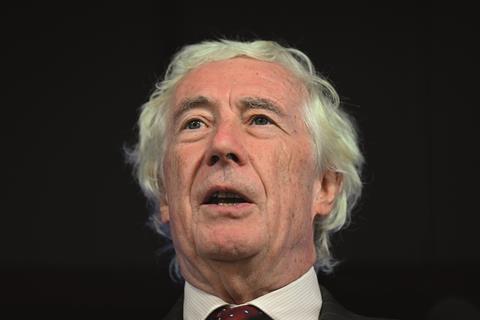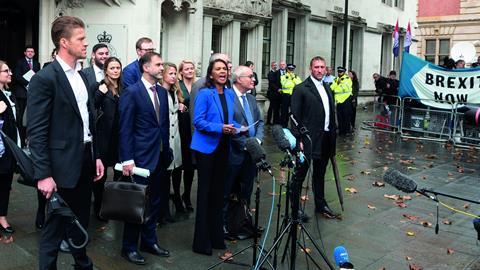Brexit campaigners promised that the UK’s departure from the EU would reverse an alleged continental drift in judgments, establishing the primacy of our highest court. Catherine Baksi asks lawyers and former judges – has anything really changed?
The low down
There has yet to be a single case since the UK left the European Union where the country’s top court has disapplied EU law. The Court of Appeal might show the way – it has considered divergence in three intellectual property cases, but disapplied EU law in only one. It is hardly the stuff of Vote Leave supporters’ dreams. The Supreme Court’s decision on the last government’s Rwanda policy reflected and accepted EU withdrawal legislation, and still found against the government. Arguably, the make-up of the court has a bigger impact on how cases before it fare. It can, after all, deviate from its own precedents. But with an uptick in unanimous judgments, lawyers note, any tensions between its apparently ‘liberal’ and ‘conservative’ justices are subtle.
Eight years after the Brexit referendum, we have arguably seen little of the dividend envisaged by advocates of Britain’s departure from the EU. The benefits claimed for Brexit relied, in nearly all cases, on divergence from standards and laws that applied to the UK under the yoke of EU membership.
The Supreme Court is now the ultimate arbiter of cases for most legal disputes in the UK. But despite talk of taking back control of laws and ditching rulings from foreign courts, there has yet to be a case where the UK’s top court has disapplied EU law.
Brexit freedoms
'To date, there is nothing in the decisions of the Supreme Court post-Brexit which might be categorised as a "Brexit Benefit"'
James Libson, Mishcon de Reya
In a move to decouple the UK from EU laws, while maintaining legal continuity and certainty, the last government introduced the Retained EU Law (Revocation and Reform) Act 2023 (REULA) to amend, repeal or replace legislation implementing EU law no longer thought desirable for the UK.
Originally billed as the ‘Brexit Freedoms Bill’, parliamentary opposition resulted in the number of laws set for the chop being scaled back and an expansion of retained EU law. Under the act, which took effect on 1 January 2024, any retained EU law that had not been revoked by the end of 2023 became ‘assimilated law’, though it does not need to be interpreted in line with EU law principles.
James Libson, managing partner at Mishcon de Reya, tells the Gazette: ‘To date, there is nothing in the decisions of the Supreme Court post-Brexit which might be categorised as a “Brexit Benefit”.’
For now, ‘the approach still seems to be one of continued convergence with the CJEU [the Court of Justice of the European Union], rather than any ardent enthusiasm for divergence,’ says Libson, who acted for Gina Miller in both of her Supreme Court challenges. (‘Miller I’, in 2017, determined that only parliament, not the executive, could trigger Article 50, the mechanism by which a country leaves the EU. ‘Miller II’, in 2019, ruled prime minister Boris Johnson’s prorogation of parliament unlawful.)
Since REULA, both the Court of Appeal and the Supreme Court have had the freedom to depart from assimilated case law. But, notes Libson: ‘Even where they have been presented with the opportunity to do so, they have not (largely) taken advantage of this freedom.’
Lawyers suggest it is too soon to tell when the Supreme Court may be prepared to diverge from CJEU rulings. Former Supreme Court justice Jonathan Sumption was a member of the 11-strong panel that heard the Miller I case, in which the court unanimously ruled that a parliamentary vote was required to trigger the Brexit starting gun.
Cases starting before 31 December 2020 continue to be governed by EU law, including case law, and the Supreme Court is still dealing with cases that arose before that date, says Sumption, who had retired from the court before Miller II.

Court of Appeal
Libson adds: ‘We have so far seen more attempts to diverge from CJEU case law in the Court of Appeal.’ He points to three intellectual property cases where the court considered divergence. In two of these, the court decided not to depart from EU authority, largely, he suggests, because it thought to do so would create legal uncertainty.
The first was in the 2021 case of Warner v TuneIn. Here, a US radio streaming service was found to have infringed the copyright of Warner Music and Sony Music Entertainment. Second, earlier this month in Thatchers v Aldi, the Somerset cider producer won an appeal in a long-running trade mark battle over lookalike packaging of a lemon cider drink.
In the third case, the court decided to depart from EU law in the trade mark matter of Industrial Cleaning Equipment (Southampton) v Intelligent Cleaning Equipment Holdings Co. But Libson says there were specific reasons why a divergent interpretation was appropriate, which will not apply in many other cases.

Lawyers also cite in explanation the Supreme Court’s reluctance to depart from its own previous rulings, which it is permitted to do. ‘It is for parliament to decide what EU legislation is to be disapplied,’ states Sumption. He suggests that where an EU legislative instrument still applies, he would expect the courts, including the Supreme Court, to be ‘extremely cautious’ about departing from decisions of the CJEU.
As an example, he points to the court’s refusal of permission to appeal a Court of Appeal decision that the EU Charter of Fundamental Rights continues to apply even after 2020 to EU citizens with settled status.
In its ruling last year, in Secretary of State for Work and Pensions v AT, the Court of Appeal upheld a decision that EU citizens with pre-settled status and no other right to reside have a right to live in the UK in dignified conditions, and they cannot be refused social assistance, such as universal credit, if doing so would risk a breach of that right.
Tom de la Mare KC of Blackstone Chambers notes that in Lipton v BA Cityflyer Ltd [2024] UKSC 24, the Supreme Court provides an insight into the application of retained EU laws in the UK.
The case concerned a British couple’s battle for compensation after their January 2018 flight was cancelled when a pilot fell ill off-duty. The claimants commenced proceedings shortly after. But by the time the matter reached the Court of Appeal, the UK had left the EU. The court ruled that the pilot’s illness did not amount to an ‘extraordinary circumstance’ as claimed by the airline, which would have meant it did not have to pay compensation.
More widely, it said that in considering a pre-Brexit cause of action under an EU regulation, it is the version in force at the time of the relevant events that applies – and not, as the Court of Appeal held, the version amended post-Brexit. Although the couple’s case was decided under pre-Brexit EU law, the protections given to aviation passengers are retained, in slightly amended form, by the Air Passenger Rights and Air Travel Organisers’ Licensing (Amendment) (EU exit) Regulations 2019.
The case can therefore be relied on by passengers whose flights were cancelled, regardless of whether the cancellation predated Brexit.
Cases in the pipeline
The Supreme Court is scheduled to hear several cases on areas of assimilated or retained EU law:
- THG Plc (Respondent) v Zedra Trust Company (Jersey) Ltd (Appellant) concerns an action arising after the appellant was excluded from a share issue by the respondent company and will consider whether there is a statutory limitation period applicable to a claim under section 994 of the Companies Act 2006.
- C G Fry & Son Ltd (Appellant) v Secretary of State for Levelling Up, Housing and Communities and another (Respondents) – the case will test whether nutrient neutrality rules apply in cases where a development received planning consent before the introduction of Natural England’s guidance on the issue. CG Fry & Son was given outline planning permission for 650 homes in 2015 but has been unable to build the third phase of the scheme after Somerset West and Taunton Council said it did not meet subsequently-introduced nutrient neutrality rules.
- R (on the application of Jwanczuk) (Respondent) v Secretary of State for Work and Pensions (Appellant) concerns the refusal of bereavement support payment by a man, following the death of his wife, who had been unable to work due to long-term disability, which he argues amounts to discrimination under Article 14 of the European Convention on Human Rights.
- The Prudential Assurance Company Ltd (Appellant) v Commissioners for His Majesty’s Revenue and Customs (Respondent) is an appeal by Prudential of a Court of Appeal ruling that VAT is due on payments once a party has left a UK VAT group.
- Northumbria Healthcare NHS Foundation Trust (Respondent) v Commissioners for His Majesty’s Revenue and Customs (Appellant) is an appeal by HM Revenue & Customs, which was ordered to pay £267,443 in wrongly claimed value added tax back to Northumbria Healthcare NHS Foundation Trust following a ruling in the Court of Appeal.
Rwanda
Lord Carter of Haslemere, cross-bench peer and consultant in the public law team at Kingsley Napley, suggests that the court’s ruling on the Conservative government’s Rwanda policy also gives an indication of how it will treat post-Brexit EU law issues. One issue considered by the court, he explains, was whether the EU Asylum Procedures Directive – which only permitted asylum seekers to be removed to a safe third country if they had some connection with it – continued to have effect in the UK as retained EU law.
None of the claimants had any connection to Rwanda and they all argued they could not be sent there. ‘The Supreme Court held that it had previously been part of retained EU law following Brexit, but that the effect of the Immigration and Social Security Co-ordination (EU Withdrawal) Act 2020 was that it ceased to be so,’ explains Carter.
Yet the point did not prove critical to the outcome of the case, since the court ruled that Rwanda was not a safe third country under human rights law because there was a real risk of refoulement to the claimants’ home countries, where they might face persecution or other inhuman treatment.
Carter says the ruling could have been significant if it had found the Procedures Directive had continued to be part of retained EU law, since the secretary of state had conceded that the Rwanda scheme was not compatible with it. That would have meant that the government would have had to legislate on that point as well as legislating, as it controversially did, to declare Rwanda safe for ECHR purposes.
Immigration
Libson suggests that, in time, the Supreme Court and the Court of Appeal may take the opportunity to depart from CJEU case law where they consider it right to do so, adding that it will most likely arise in areas of practice such as intellectual property, data protection, competition law, jurisdiction and tax law.
Sumption predicts that the thorny and politically controversial issue of immigration will prove to be the main area in which the courts will be tempted to depart from EU case law, due to the amount of legislation on the subject passed since 2020, some of which may be said to have changed parliament’s policy objectives.
Some suggest that Conservative disappointment that the higher courts had not used their power to depart from CJEU case law led to REULA legislation containing a provision intended to give those higher courts a push to be ‘brave’, and effect such departures.
This provision comprised a series of factors for the courts to take into account when considering whether to depart from CJEU case law. It was scheduled to come into effect last October, but appears to have been kicked into the long grass by the government.
Libson observes: ‘The language and actions of the Labour party in government have very much been in line with commitments in opposition to the rule of law and a resetting of the sometimes fractious relationship between the government and the courts – including the Supreme Court.’
But, he warns: ‘There is bound to be tension if the pressures on the government to liberalise the economy are perceived, at least politically, to be “thwarted” by law and regulation and the courts.’ He adds: ‘The politics of populism here and abroad may also test the resetting of the relationship.’
Court less divided?
Rather than Brexit, lawyers suggest the make-up of the court has had more effect on its rulings. Since its inception in 2009, the court has had four presidents: Lord Phillips of Worth Matravers, Lord Neuberger of Abbotsbury, Lady Hale of Richmond and Lord Reed of Allermuir.
There are cases in which a differently composed court might have made a different decision. Sumption reflects that he observed this possibility ‘quite often’ when he was on the bench ‘because the court was then more divided in its approach to governmental and parliamentary policy’.
'The Supreme Court held that on questions of policy, the courts should take their cue from parliamentary legislation and ministerial decisions which parliament may be said to have approved'
Jonathan Sumption, former Supreme Court justice
Since then, he has observed a significant shift, chiefly around the court’s decisions in the 2020 Shamima Begum case. It unanimously found in favour of the home secretary’s appeal against a Court of Appeal order that Begum should be given leave to enter the UK. Second, in 2021 in R (on the application of SC, CB and 8 children) v Secretary of State for Work and Pensions and Others, the court dismissed a challenge to the government’s ‘two-child limit’ restricting benefits payments.
‘In both cases, the Supreme Court held that on questions of policy, the courts should take their cue from parliamentary legislation and ministerial decisions which parliament may be said to have approved,’ explains Sumption.
The court today, suggest some lawyers – none of whom was willing to be named – has adopted a more collegiate approach to its rulings, with more unanimous judgments. They note a more conservative approach since Reed became president in 2020, compared with what was perceived as a more liberal approach during the terms of Neuberger and Hale.
One barrister observes that since Reed became president, the government has started winning more cases and the court has sought to ‘row back’ from rulings given under the previous two presidents. In certain public law cases, suggests another barrister, the Supreme Court has ‘become a very difficult place for claimants to win’.
But one public law solicitor, who has acted successfully in several recent cases, disagrees. ‘The idea that it is gunning against claimants suggests that the judiciary is not independent, and I wouldn’t suggest that is the case,’ she says.

Seamless transition
The Supreme Court was established under the Constitutional Reform Act 2005, replacing the judicial committee of the House of Lords. It marked its 15th anniversary last year. In that time it has heard more than 1,100 cases in front of 33 justices, and provided more than six million live and on-demand streams of cases.
The court’s first president, Lord Phillips, recalls being given the message that there should be a ‘seamless transition’ from the appellate committee of the House of Lords – and he says that is what happened.
But, along with the move to the old Middlesex Guildhall Crown Court building on the opposite side of Parliament Square from the Palace of Westminster, Phillips says: ‘One of the objects was to turn the court into an institution which the general public understood.’ To increase transparency and engagement, the court televised and live-streamed its hearings, gave brief explanations of rulings and published press summaries of judgments. This, says Phillips, has made it easier for the ‘man in the street’ to understand.
Others, including Sumption, agree that the fact that its decisions are better understood has been the biggest difference from what went before. As an example, he says that when the Supreme Court upheld the High Court’s ruling in Miller – which had prompted the Daily Mail’s ‘Enemies of the People’ headline – ‘nothing of the kind happened’ in relation to the top court.
Sumption suggests: ‘The main reason was that anyone who cared to listen into the [court] hearings could see that it was an argument about legal principle, not politics.’
Catherine Baksi is a freelance journalist
































No comments yet